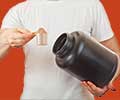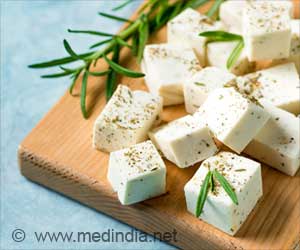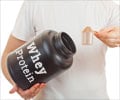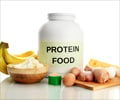- Capadia, K. “Blowing the myths surrounding supplements”. Director, K11 Academy
About
Are you getting adequate amounts of protein from food? If not, then you need to supplement protein in your diet as it can improve your overall fitness and well-being.

Most of us tend to look unfit and out of shape due to high fat and less lean body mass. Consuming a healthy diet in this ‘fast food’ age requires constant effort. We may not be aware of the diet regimes being followed by us are fulfilling our daily requirements or not. Nutrients are lost due to excessive cooking and their absorption is also variable. Majorly we are unable to meet the protein, micronutrient and fiber requirements due to poor fruit vegetable, pulse and whole grain consumption.
Readily available foods and cooking methods make food energy dense rather than nutrient dense. If we get an adequate amount of protein from food, then there is no need for supplementation, but if not then supplementing the diet with protein can make a difference to overall fitness and well-being.
Protein or nutrition supplements are of various kinds. As a common man we know them by the following names:
- Body building supplements like (Flax protein powder, whey protein powder)
- Nutrition or protein supplements for the adults and elderly (Humyll, Nutribody Protein, Amways Nutrilite)
- Clinical Protein supplements for all age groups – (Resource high protein powder, Protinex, Protinex junior)
- Diabetic protein supplements Meal replacement powders, beverages, bars
- High protein bars, meal replacement bars
- Commercially popular supplements for all age groups (Horlicks, Bournvita, Boost, Malto, Women’s Horlicks)
Carnitine monohydrate and glutamine are protein based meal replacers and weight gainers. They have almost 3 times as much carbs as protein and should be consumed only by people who have high metabolisms and need the protein sparing effect of carbohydrates to promote lean body mass gain. Most of the protein supplements are either a single type of protein or in combination with others.
Whey Protein
It is a component of milk protein and has the highest bio-availability rating amongst all proteins. Milk protein is 20 percent whey and 80 percent casein, which is quickly absorbed by the body.
The quantity of protein provided by a glass of milk is low and hence a large quantum has to be consumed to meet the daily demand. Therefore, to meet the need whey protein powders present in protein mixes are needed to formulate various protein supplements.
Soya Protein
It contains all essential amino acids and is a good quality protein source for vegetarians.
Egg White Protein
It is considered as a superior source of protein.
Protein supplements, also contain vitamins, minerals, herbs like ginseng, spirulina (sea plant protein), some spices like cinnamon, vanilla, stabilizers, preservatives and antioxidants.
Protein Requirements
For once it's easier to maintain a desirable weight if one consumes a low carbohydrate, low fat but a moderate to high protein diet. Also excess protein does not turn into fat or get stored as fat. In addition, to keep the muscles healthy and prevent their wastage or atrophy (as we get older), it is essential that we eat a protein rich diet and exercise daily.
Protein is the building block of our body and is required to build muscles and repair tissues. Any inadequacy will use it up for carrying out the routine bodily functions, leaving no proteins left to be used for the purpose of muscle building. In addition it would also have an adverse effect on our body's immune system.
It is especially important to supplement when you are on a body building program. A person who works out regularly thrice a week suffers from micro trauma of muscles. Athletes require additional protein to supplement their diets and training efforts.
People who are not overly active will use the normal amount to perform bodily functions. People who are highly active (such as athletes and bodybuilders) subject their muscles to an increased level of wear and tear, and therefore, require additional protein supplements to keep themselves in shape.
For active, working-out individuals one has to consume around 2 grams protein per kilogram of body weight for men and about 1 to 1.5 gm per kilo of body weight for women. It means that if you are a male and weigh 70 kilograms, your daily requirement would be about 140 gm of protein.
For sedentary individuals (who are least active) 0.8 gm protein per kilo of bodyweight is the recommendation, which would be about 56 gms for a male weighing 70 kilograms. Generally the big mistake lies in not understanding the difference in protein requirements between active people and sedentary people.
If one is getting the requisite quantum of protein from food then we don’t need to supplement, but if we are not (which is the case 90% of the time) then one should supplement the diet with protein supplements.
For example, if one needs 50gm of protein and the individual is getting 40 gm from food then the rest 10gm should be obtained through a supplement. It’s as simple as that.
Milk, milk powders and milk products, pulses, egg, fish, meat and its products are the major protein contributors to our diets. On taking a closer look at the daily diets, it is evident that we almost always fail to be even close to the recommended amounts. Only people making conscious efforts to mandatorily include protein-rich food and supplements in meals meet the recommendations.
For example, a moderately active (exercises thrice a week) housewife weighing 50 kilograms requires to consume around 50 gm of total protein (1 g protein per kilogram of bodyweight). In her daily diet, she consumes four chappatis, 2 slices of bread, 2 cups (1 cup = 150 ml) of dal, 200 ml full fat buffalo milk, 1 cup curd, 1 fruit, two to three helpings of vegetables.
- 4 chappatis gives around 9 gm protein,
- 2 slices of medium sized white bread gives around 3.3 g protein,
- 2 cups dal gives around 14 gm protein,
- 200 ml buffalo milk gives around 8.6 gm protein,
- 1 cup curd gives around 6.5 gm protein.
This amounts to a total of 41 gm protein versus the recommended amount of 50 gm per day. Also taking into account the bioavailability and absorption losses our body actually falls short of protein. Most of us consuming 2 cups of dal and enough milk would boast of our diets being protein rich. Though the diet being nutritious, balanced and wholesome, in reality falls short of the most important macronutrinet protein.
Apart from body builders, protein supplements are extremely important for people whose daily needs are not met by diet alone. Children, elderly and people who do not eat well, people who stay away from home can greatly benefit from some kind of protein supplement. Even women during pregnancy or lactation have to consume extra protein.
One can mix a protein supplement in milk, milkshake, juice or water. It could be taken once or twice a day in between meals, with the meal or before a meal or even as a meal replacer if necessary. While it is theoretically better to stick to fresh, natural foods, protein supplements taken daily will rather benefit the body to meet its protein needs.
We can include protein into our diets through simple means. Below are a few simple ways to do it:
- Consuming sprouts, whole pulses in breakfast or mid meals.
- Consuming judicious amounts of zero fat milk and low fat curds.
- Addition of skim milk powder to milk, milk shakes, lassi, wheat flour.
- Mixing wheat flour with pulse flours and millet flours.
- Adding ready grain mixes or nutri mixes like saffola diabetic mix to food preparations like pancakes, idlis, dosas, dhoklas etc.
- Consuming egg whites instead of whole eggs.
- Adding readily available protein supplements like protinex, hummyl powder, resource high protein powder, amways nutrilite to skim milk.















Although to take exercises, taking nutritious food is also helpful to gain a fit and fine body. Your personal fitness trainer and health consultant’s advice is also helpful to take.